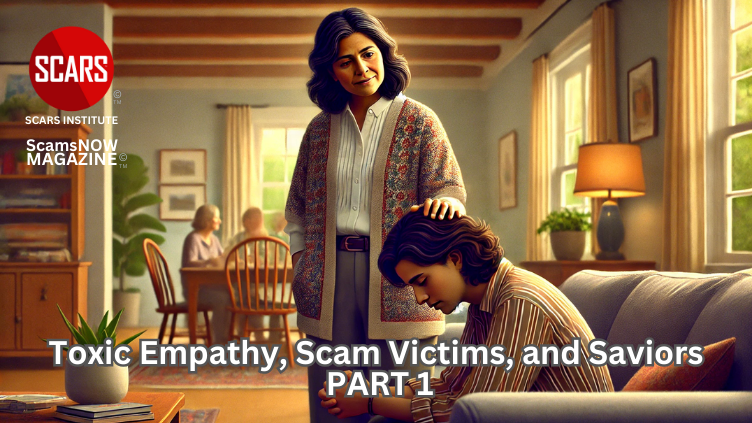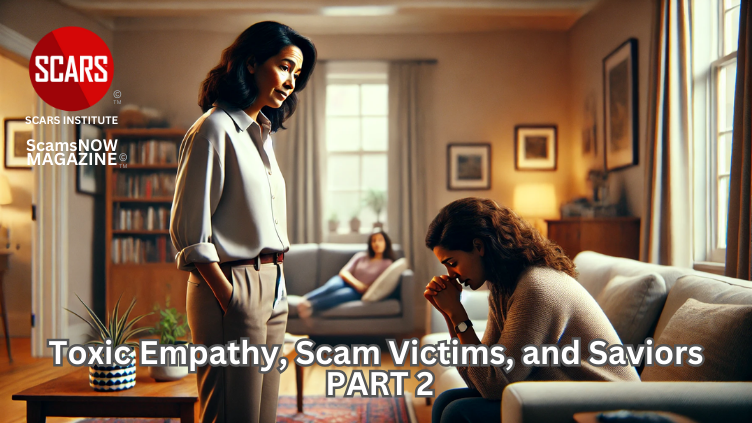Toxic Empathy, Scam Victims, and Saviors – PART 2
How Scam Victims Can Tell the Difference Between a Savior Expressing Toxic Empathy and a Legitimate Expert Professional
Primary Category: Scam Victim Recovery Psychology & Scam Victim Advocacy
Intended Audience: Scam Victims-Survivors / Family & Friends / General Public / Others
Authors:
• Tim McGuinness, Ph.D., DFin, MCPO, MAnth – Anthropologist, Scientist, Polymath, Director of the Society of Citizens Against Relationship Scams Inc.
About This Article
Scam victims seeking support must differentiate between legitimate experts and advocates exhibiting toxic empathy or savior syndrome. Toxic saviors create dependency, reinforce victimhood, and fuel anger rather than guiding victims toward real recovery. They may push for revenge, exaggerate threats, or discourage victims from seeking alternative support.
In contrast, legitimate professionals empower victims with structured recovery strategies, encourage self-sufficiency, and provide fact-based, ethical guidance. A true expert helps victims rebuild confidence and regain control of their lives, rather than keeping them emotionally trapped. Scam victims should vet those offering assistance, ensuring their support fosters healing rather than prolonging distress. Choosing the right advocate is crucial—real recovery comes from strength, clarity, and independence, not from remaining stuck in fear, anger, or dependency.

Part 2 – How Scam Victims Can Tell the Difference Between a Savior Expressing Toxic Empathy and a Legitimate Expert Professional
Scam victims, in their search for support and recovery, often encounter two types of individuals offering help: those who provide legitimate expertise and professional guidance, and those who, driven by toxic empathy and savior syndrome, do more harm than good. It is crucial for victims to discern between the two, as falling into the hands of an overzealous “savior” can trap them in perpetual victimhood rather than leading them toward true recovery.
Here are key differences between a toxic savior and a legitimate expert that scam victims should look out for:
The Approach to Victim Empowerment
A toxic savior encourages dependency
They make the victim feel helpless without their constant guidance. They may say things like, “Without me, you won’t know how to recover,” or “Only I truly understand what you’ve been through.” They often position themselves as the only reliable source of truth.
A legitimate expert empowers self-recovery
A true professional teaches skills, strategies, and critical thinking tools to help victims reclaim control over their own recovery. They say things like, “You have the strength to heal, and I’ll give you the tools to help you do it.” Their goal is to help victims regain independence, not rely on them indefinitely.
Emotional vs. Rational Guidance
A toxic savior fuels emotions rather than providing solutions
They may keep victims stuck in anger, outrage, and blame, continuously reinforcing a sense of injustice while offering no concrete steps toward resolution. They encourage prolonged emotional venting but rarely guide victims toward practical solutions.
A legitimate expert provides a structured path forward.
A professional validates emotions but does not dwell on them indefinitely. Instead, they offer structured approaches to healing, such as therapy, trauma recovery methods, financial guidance, and scam prevention education.
The Focus: Recovery vs. Retaliation
A toxic savior fixates on revenge and punishment
They may obsess over tracking down scammers, demanding justice, or seeking public exposure. While legal accountability is important, they often prioritize retribution over victim healing, making victims feel that they must stay in the fight rather than move on.
A legitimate expert focuses on personal healing and prevention.
A professional helps victims come to terms with reality—that many scammers will never be caught—and focuses on regaining control over their own lives. They may guide victims through law enforcement reporting options, but they do not make justice a prerequisite for recovery.
Boundaries and Professionalism
A toxic savior lacks professional boundaries
They may overstep personal boundaries, inserting themselves into the victim’s life beyond what is appropriate. They might share too much personal information, demand constant updates, or expect loyalty from the victim. They may also reject criticism or discourage victims from seeking help elsewhere.
A legitimate expert maintains clear ethical boundaries
Professionals operate within ethical guidelines—they are clear about their role, services, and limitations. They do not seek personal validation through their work, and they encourage victims to seek a variety of resources, not just their own. Always ask where their ethical standards are published and what they re based on.
Fact-Based vs. Fear-Based Information
A toxic savior exaggerates threats and creates paranoia
They may spread misinformation, conspiracy theories, or exaggerated claims about scams, law enforcement, or recovery, making victims feel like the world is against them. This creates unnecessary fear rather than helping victims think clearly.
A legitimate expert provides factual, well-researched information
A professional relies on evidence-based practices and verifiable resources. They encourage critical thinking and help victims separate emotion from fact, ensuring they make informed decisions.
Their Personal Motivation
A toxic savior seeks recognition and control
They may enjoy being seen as a hero or expect constant validation and appreciation from victims. If they are challenged, they may react with defensiveness or hostility.
A legitimate expert is results-driven and victim-focused
Their priority is the victim’s well-being, not their own ego. They measure success by victims regaining independence and confidence, not by how much attention or credit they receive.
Professional Support vs. Exploitation
A toxic savior profits from victim dependency.
Some toxic advocates monetize victims’ pain, either by selling expensive, unproven courses, demanding donations, or creating an us-versus-them dynamic to keep victims dependent.
A legitimate expert provides transparent, ethical services.
If they charge for services, they are upfront about costs, qualifications, and outcomes. Many legitimate professionals (such as the SCARS Institute) offer free or low-cost support to ensure access for all scam victims.
Note: There is nothing wrong with a nonprofit accepting donations, or selling something beneficial, such as self-help books. Just make sure they are a real none-profit with an established history of real support and advocacy.
How to Protect Yourself from Toxic Advocacy
If you are a scam victim, it is crucial to vet anyone offering help before committing to their advice.
Here’s how:
Ask for qualifications
A legitimate expert will have credentials, experience, or professional training in areas like trauma recovery, financial fraud prevention, psychology, or law enforcement.
Look for structure and solutions
Ask, “What are the actual steps I should take?” If they only offer emotional venting without concrete recovery strategies, be cautious.
Be wary of exclusivity
If they discourage you from seeking other resources, they may be imposing dependency rather than independence.
Watch for extreme emotional manipulation
A good advocate helps regulate emotions, not fuel anger or paranoia.
Trust your instincts
If something feels off, take a step back. Good support should make you feel stronger, not weaker.
Conclusion: Choose Your Support Wisely
Scam victims deserve real, constructive support, not emotional entrapment or misplaced savior syndrome. While toxic empathy and overzealous advocacy may seem well-intended, they can ultimately trap victims in prolonged suffering, helplessness, or unrealistic expectations.
A true expert or ethical advocate will empower victims, provide factual guidance, and encourage self-sufficiency—helping them move forward rather than remain stuck in their pain. Scam victims should be cautious of self-proclaimed saviors, focusing instead on professionals and organizations that prioritize evidence-based recovery strategies.
The right kind of support leads to strength, clarity, and healing—not dependency, anger, or paranoia.
To learn more about the SCARS Institute (Society of Citizens Against Relationship Scams Inc.) visit www.AgainstScams.org See more SCARS Institute resources below.
-/ 30 /-
What do you think about this?
Please share your thoughts in a comment below!
Statement About Victim Blaming
SCARS Institute articles examine different aspects of the scam victim experience, as well as those who may have been secondary victims. This work focuses on understanding victimization through the science of victimology, including common psychological and behavioral responses. The purpose is to help victims and survivors understand why these crimes occurred, reduce shame and self-blame, strengthen recovery programs and victim opportunities, and lower the risk of future victimization.
At times, these discussions may sound uncomfortable, overwhelming, or may be mistaken for blame. They are not. Scam victims are never blamed. Our goal is to explain the mechanisms of deception and the human responses that scammers exploit, and the processes that occur after the scam ends, so victims can better understand what happened to them and why it felt convincing at the time, and what the path looks like going forward.
Articles that address the psychology, neurology, physiology, and other characteristics of scams and the victim experience recognize that all people share cognitive and emotional traits that can be manipulated under the right conditions. These characteristics are not flaws. They are normal human functions that criminals deliberately exploit. Victims typically have little awareness of these mechanisms while a scam is unfolding and a very limited ability to control them. Awareness often comes only after the harm has occurred.
By explaining these processes, these articles help victims make sense of their experiences, understand common post-scam reactions, and identify ways to protect themselves moving forward. This knowledge supports recovery by replacing confusion and self-blame with clarity, context, and self-compassion.
Additional educational material on these topics is available at ScamPsychology.org – ScamsNOW.com and other SCARS Institute websites.
-/ 30 /-
What do you think about this?
Please share your thoughts in a comment below!
3 Comments
Leave A Comment
Important Information for New Scam Victims
- Please visit www.ScamVictimsSupport.org – a SCARS Website for New Scam Victims & Sextortion Victims.
- SCARS Institute now offers its free, safe, and private Scam Survivor’s Support Community at www.SCARScommunity.org – this is not on a social media platform, it is our own safe & secure platform created by the SCARS Institute especially for scam victims & survivors.
- SCARS Institute now offers a free recovery learning program at www.SCARSeducation.org.
- Please visit www.ScamPsychology.org – to more fully understand the psychological concepts involved in scams and scam victim recovery.
If you are looking for local trauma counselors, please visit counseling.AgainstScams.org
If you need to speak with someone now, you can dial 988 or find phone numbers for crisis hotlines all around the world here: www.opencounseling.com/suicide-hotlines
Statement About Victim Blaming
Some of our articles discuss various aspects of victims. This is both about better understanding victims (the science of victimology) and their behaviors and psychology. This helps us to educate victims/survivors about why these crimes happened and not to blame themselves, better develop recovery programs, and help victims avoid scams in the future. At times, this may sound like blaming the victim, but it does not blame scam victims; we are simply explaining the hows and whys of the experience victims have.
These articles, about the Psychology of Scams or Victim Psychology – meaning that all humans have psychological or cognitive characteristics in common that can either be exploited or work against us – help us all to understand the unique challenges victims face before, during, and after scams, fraud, or cybercrimes. These sometimes talk about some of the vulnerabilities the scammers exploit. Victims rarely have control of them or are even aware of them, until something like a scam happens, and then they can learn how their mind works and how to overcome these mechanisms.
Articles like these help victims and others understand these processes and how to help prevent them from being exploited again or to help them recover more easily by understanding their post-scam behaviors. Learn more about the Psychology of Scams at www.ScamPsychology.org
SCARS INSTITUTE RESOURCES:
If You Have Been Victimized By A Scam Or Cybercrime
♦ If you are a victim of scams, go to www.ScamVictimsSupport.org for real knowledge and help
♦ SCARS Institute now offers its free, safe, and private Scam Survivor’s Support Community at www.SCARScommunity.org/register – this is not on a social media platform, it is our own safe & secure platform created by the SCARS Institute especially for scam victims & survivors.
♦ Enroll in SCARS Scam Survivor’s School now at www.SCARSeducation.org
♦ To report criminals, visit https://reporting.AgainstScams.org – we will NEVER give your data to money recovery companies like some do!
♦ Follow us and find our podcasts, webinars, and helpful videos on YouTube: https://www.youtube.com/@RomancescamsNowcom
♦ Learn about the Psychology of Scams at www.ScamPsychology.org
♦ Dig deeper into the reality of scams, fraud, and cybercrime at www.ScamsNOW.com and www.RomanceScamsNOW.com
♦ Scam Survivor’s Stories: www.ScamSurvivorStories.org
♦ For Scam Victim Advocates visit www.ScamVictimsAdvocates.org
♦ See more scammer photos on www.ScammerPhotos.com
You can also find the SCARS Institute’s knowledge and information on Facebook, Instagram, X, LinkedIn, and TruthSocial
Psychology Disclaimer:
All articles about psychology and the human brain on this website are for information & education only
The information provided in this and other SCARS articles are intended for educational and self-help purposes only and should not be construed as a substitute for professional therapy or counseling.
Note about Mindfulness: Mindfulness practices have the potential to create psychological distress for some individuals. Please consult a mental health professional or experienced meditation instructor for guidance should you encounter difficulties.
While any self-help techniques outlined herein may be beneficial for scam victims seeking to recover from their experience and move towards recovery, it is important to consult with a qualified mental health professional before initiating any course of action. Each individual’s experience and needs are unique, and what works for one person may not be suitable for another.
Additionally, any approach may not be appropriate for individuals with certain pre-existing mental health conditions or trauma histories. It is advisable to seek guidance from a licensed therapist or counselor who can provide personalized support, guidance, and treatment tailored to your specific needs.
If you are experiencing significant distress or emotional difficulties related to a scam or other traumatic event, please consult your doctor or mental health provider for appropriate care and support.
Also read our SCARS Institute Statement about Professional Care for Scam Victims – click here
If you are in crisis, feeling desperate, or in despair, please call 988 or your local crisis hotline – international numbers here.
More ScamsNOW.com Articles
A Question of Trust
At the SCARS Institute, we invite you to do your own research on the topics we speak about and publish. Our team investigates the subject being discussed, especially when it comes to understanding the scam victims-survivors’ experience. You can do Google searches, but in many cases, you will have to wade through scientific papers and studies. However, remember that biases and perspectives matter and influence the outcome. Regardless, we encourage you to explore these topics as thoroughly as you can for your own awareness.















![NavyLogo@4x-81[1] Toxic Empathy - Scam Victims and Saviors - PART 2 - 2025](https://scamsnow.com/wp-content/uploads/2025/04/NavyLogo@4x-811.png)









![scars-institute[1] Toxic Empathy - Scam Victims and Saviors - PART 2 - 2025](https://scamsnow.com/wp-content/uploads/2025/04/scars-institute1.png)

![niprc1.png1_-150×1501-1[1] Toxic Empathy - Scam Victims and Saviors - PART 2 - 2025](https://scamsnow.com/wp-content/uploads/2025/04/niprc1.png1_-150x1501-11.webp)
Desafortunadamente cuando eres victima de estafa todo es un caos y la desesperacion en ocaciones te lleva a buscar soluciones que lejos de ayudarte pueden hundirte mas. El odio, la venganza o el querer hacer justicia lo unico que provoca es confundirte mas … Lo mejor es buscar ayuda de profesionales que su objetivo sea ayudarte a enfocarte en tu recuperacion personal, en ayudarte a tener conocimiento. Alguien que realmente quiera lo mejor para ti nunca te alentara al odio o venganza
Very important information for all victims of fraud looking for support
– what is the nature and effect of false empathy
– how to protect against it and how to choose professional support.
Very important information for all victims of scams seeking support:
-what characterizes and results in false empathy
-what to pay attention to when seeking professional support.